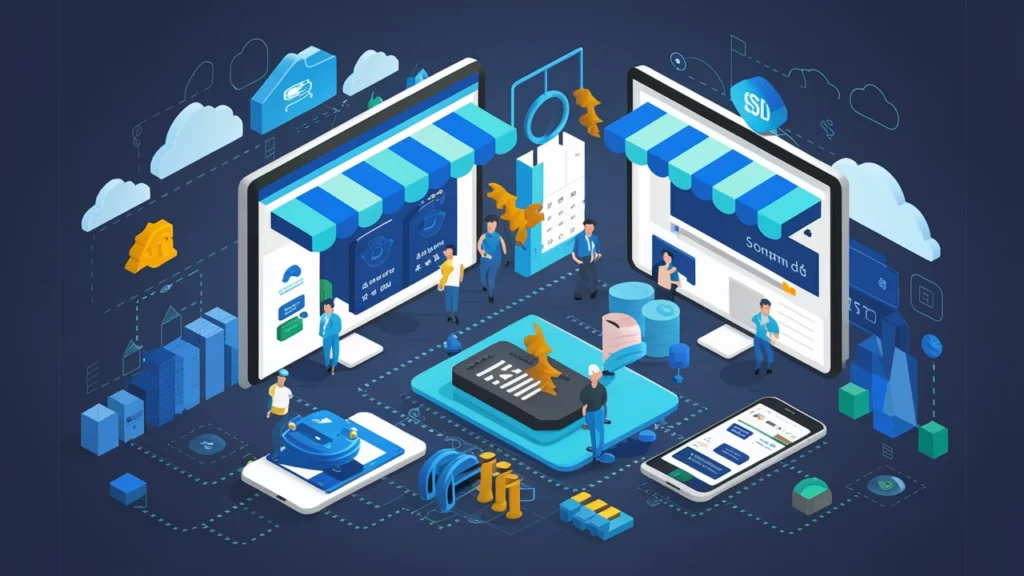In today’s digital age, the landscape of commerce has undergone a significant transformation, with e-commerce becoming increasingly prevalent. Businesses, whether small startups or large enterprises are embracing e-commerce portal services to expand their reach, enhance customer experience, and boost sales. But what exactly are the key features that make these e-commerce portals indispensable for businesses? Let’s delve into the core functionalities that define these platforms.
1. User-Friendly Interface
A seamless user experience is paramount for any e-commerce portal. A user-friendly interface ensures that visitors can navigate through the website effortlessly, leading to higher engagement and conversion rates. Key components of a user-friendly interface include intuitive navigation menus, clear call-to-action buttons, and a responsive design that adapts to various devices.
2. Product Catalog Management
Efficient management of product catalogs is crucial for showcasing merchandise effectively. E-commerce portals should offer features for easy uploading, editing, and organizing of products. Categorization and tagging options enable customers to filter and find products quickly, streamlining the shopping process
3. Secure Payment Gateway Integration
Security is paramount in e-commerce transactions to instill trust and confidence among customers. Integration of a secure payment gateway with SSL certification ensures that sensitive information such as credit card details is encrypted during transactions. Offering multiple payment options further enhances convenience for customers.
4. Order Management System
An effective order management system is essential for handling the entire lifecycle of orders, from placement to fulfillment. Features like order tracking and inventory management enable businesses to monitor and fulfill orders efficiently, reducing errors and delays.
5. Customer Relationship Management (CRM)
Personalization is key to building strong customer relationships in e-commerce. CRM tools empower businesses to create personalized user experiences through targeted marketing campaigns, tailored product recommendations, and effective communication channels. Additionally, feedback and review systems allow customers to provide valuable input, fostering trust and loyalty.
6. Analytics and Reporting
Data-driven insights are invaluable for optimizing e-commerce operations and improving performance. Advanced analytics tools provide businesses with comprehensive reports on sales metrics, customer behavior, and website performance. This information enables informed decision-making and targeted strategies for growth.
7. Mobile Compatibility
With the rise of mobile commerce, e-commerce portals must prioritize mobile compatibility. Developing dedicated mobile apps and ensuring responsive website design cater to the growing number of users accessing platforms through smartphones and tablets.
8. SEO and Marketing Tools
To stand out in a crowded online marketplace, e-commerce portals need robust SEO and marketing capabilities. Implementing SEO best practices ensures high visibility in search engine results, while integration with social media platforms facilitates broader reach and engagement with potential customers.
9. Scalability and Flexibility
As businesses grow, e-commerce portals must be able to scale and adapt to evolving needs. Scalable infrastructure and flexible architecture enable platforms to handle increased traffic, accommodate new features, and integrate with third-party services seamlessly.
10. Customer Support
Prompt and efficient customer support is essential for resolving inquiries and issues in real time. Features like live chat support and help desk systems enable businesses to provide immediate assistance, enhancing the overall customer experience.
11. Security Measures
Protecting sensitive customer data from cyber threats is paramount in e-commerce. Implementation of robust security measures such as data encryption and fraud detection systems safeguards against unauthorized access and fraudulent activities, ensuring trust and confidence among customers.
12. Multi-language and Multi-currency Support
Catering to a global audience requires support for multiple languages and currencies. Localization features enable businesses to tailor content and pricing according to the preferences of diverse customer segments, facilitating international expansion and sales.
13. Customization Options
Every business has unique requirements and preferences when it comes to e-commerce solutions. Customization options allow businesses to tailor their e-commerce portals according to specific needs, whether it’s integrating custom features or designing a unique user interface.
14. Scalability and Flexibility
As businesses grow, e-commerce portals must be able to scale and adapt to evolving needs. Scalable infrastructure and flexible architecture enable platforms to handle increased traffic, accommodate new features, and integrate with third-party services seamlessly.
15. Case Studies of Successful e-Commerce Portals

1. Amazon
Amazon is one of the most well-known e-commerce portals globally. Founded in 1994 by Jeff Bezos, Amazon started as an online bookstore but quickly diversified its offerings to include a wide range of products, from electronics to clothing. With a focus on customer experience, competitive pricing, and efficient logistics, Amazon has become synonymous with online shopping convenience. Its success can be attributed to its user-friendly interface, personalized recommendations, and robust delivery network, making it a prime example of effective e-commerce portal management.
2. Alibaba
Alibaba, founded by Jack Ma in 1999, has revolutionized e-commerce in China and beyond. Initially launched as a B2B marketplace connecting Chinese manufacturers with international buyers, Alibaba has since expanded its platform to include B2C and C2C e-commerce, cloud computing, and digital payment services. With its vast product selection, competitive pricing, and innovative technologies like Alipay and AliExpress, Alibaba has emerged as a global e-commerce giant, catering to millions of customers worldwide. Alibaba Course
3. Shopify
Shopify is a leading e-commerce platform that empowers businesses of all sizes to build and manage their online stores effortlessly. Founded in 2006 by Tobias Lütke, Shopify offers a comprehensive suite of tools and services, including website design, payment processing, inventory management, and marketing solutions. Its user-friendly interface, customizable templates, and extensive app ecosystem make it a preferred choice for entrepreneurs and businesses looking to establish a professional online presence and drive sales.
16. Challenges Faced by e-Commerce Portal Services
1. Security Threats
One of the most significant challenges faced by e-commerce portal services is the ever-present threat of cybersecurity breaches. As e-commerce transactions involve the exchange of sensitive customer information such as credit card details and personal data, e-commerce portals are prime targets for cybercriminals. Ensuring robust security measures such as encryption, authentication, and regular security audits is essential to safeguarding customer data and maintaining trust.
2. Competition
The e-commerce landscape is highly fierce (competitive), with countless businesses vying for the attention of online shoppers. E-commerce portal services must constantly innovate and differentiate themselves to stay ahead of the competition. This includes offering unique products, providing exceptional customer service, and optimizing marketing strategies to attract and retain customers in a crowded marketplace.
3. Technology Integration
E-commerce portal services often rely on a complex ecosystem of technologies and third-party services to deliver a seamless shopping experience. However, integrating and managing these technologies can be challenging, especially for businesses with limited technical expertise. Ensuring compatibility, scalability, and reliability across various platforms and devices is essential for delivering a consistent and cohesive user experience.
17. Future Trends in e-Commerce Portal Development
1. Personalization
Personalization will continue to be a key trend in e-commerce portal development, with businesses leveraging data analytics and artificial intelligence to tailor the shopping experience to individual preferences and behavior. From personalized product recommendations to targeted marketing campaigns, e-commerce portals will increasingly focus on delivering hyper-personalized experiences that drive engagement and conversions.
2. Omnichannel Integration
Omnichannel integration will become increasingly important as consumers expect seamless shopping experiences across multiple channels and devices. E-commerce portals will need to integrate online and offline channels seamlessly, allowing customers to browse, purchase, and return products across various touchpoints, including websites, mobile apps, social media, and physical stores.
3. Augmented Reality (AR) and Virtual Reality (VR)
AR and VR technologies will play a significant role in the future of e-commerce portal development, enabling immersive shopping experiences that blur the lines between the digital and physical worlds. From virtual try-on experiences for clothing and accessories to interactive product demonstrations, AR and VR will enhance engagement and decision-making, driving sales and customer satisfaction.
4. Sustainability and Ethical Sourcing
With increasing consumer awareness and concern for environmental and social issues, sustainability and ethical sourcing will become integral to e-commerce portal development. Businesses will prioritize eco-friendly practices, ethical supply chains, and transparent sourcing to appeal to conscientious consumers and differentiate themselves in the market.
5. Voice Commerce
Voice commerce, facilitated (enhanced) by virtual assistants like Amazon Alexa and Google Assistant, will gain traction as consumers embrace voice-activated shopping experiences. E-commerce portals will need to optimize their platforms for voice search and voice-enabled transactions, providing convenience and accessibility to a growing segment of voice-first consumers.
18. Conclusion
In conclusion, e-commerce portal services offer a comprehensive suite of features and functionalities designed to empower businesses in the digital marketplace. From user-friendly interfaces to robust security measures and advanced analytics tools, these platforms provide the foundation for successful online commerce. By leveraging the key features outlined above, businesses can enhance their online presence, drive sales, and deliver exceptional customer experiences.
FAQs (Frequently Asked Questions)
- 1. What industries can benefit from e-commerce portal services?
- E-commerce portal services are versatile and can benefit businesses across various industries, including retail, hospitality, healthcare, and more.
- 2. Are e-commerce portal services suitable for small businesses?
- Yes, e-commerce portal services offer scalable solutions that cater to businesses of all sizes, including small startups and enterprises.
- 3. How can e-commerce portals improve customer engagement?
- E-commerce portals can improve customer engagement through personalized user experiences, targeted marketing campaigns, and interactive features such as live chat support.
- 4. What security measures should businesses prioritize in e-commerce portals?
- Businesses should prioritize measures such as SSL encryption, secure payment gateways, and fraud detection systems to ensure the security of customer data.
- 5. What role does analytics play in e-commerce portal services?
- Analytics provide businesses with valuable insights into sales performance, customer behavior, and website optimization, enabling data-driven decision-making and strategic planning.





